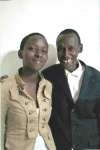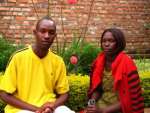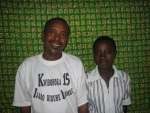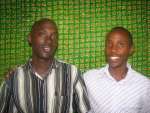Mukayiranga Verena & Mugisha Gabriel & Sharangabo Jean de Dieu
Mukayiranga Verena is speaking with two of her adopted sons, Mugisha Gabriel and Sharangabo Jean de Dieu. She tells stories of her struggles with discrimination between the different ethnicities and how there was nothing but love between all Rwandese people before the colonists arrived. Verena shares how she lived in paralyzing fear during the war saying “I could not sleep well; I would think that people would come to kill us.” Despite being traumatized by her experiences she overcame her fear and shares her story with her sons.
Kwizera Samuel & Igihozo Cindy Providence
Kwizera Samuel shares with his niece, Igihozo Cindy Providence, how people lived together in harmony regardless of ethnicity. All people in Rwanda had love for one another before the tragedy of the genocide. Emergency vehicles would not stop to check the ethnicity of a patient before taking them to the hospital. In fact, those riding the emergency vehicles would all be of different ethnicities in the first place. In those days, people helped one another.
Umazikungu Beatrice & Gashumba Yves Fabrice
Although Gashumba Yves Fabrice and longs for a peaceful future, he still has a hard time forgiving those involved in the genocide and fears the resurgence of conflict. His friend Umazikungu Beatrice reminds him that kindness toward everyone is the best way to prove that Rwanda can move forward, and it is better to be remembered for acts of kindness rather than the brief satisfaction of taking revenge and being remembered for evil.
Musabyimana Epiphanie & Hakizimana Justin
Hakizimana Justin and Musabyimana Epiphanie are siblings who lost their parents during the genocide. Since Hakizimana Justin was very young at the time, he wants his older sister to tell him about their family, ethnic discrimination, and the many hardships that she went through after the genocide. Since he has no other adult to turn to, Hakizimana Justin also asks Musayimana Epiphanie for advice about how he should behave in different settings. As any good older sister would do, she advises him on the proper way to live his life.
Uwayezu Dieu Domme & Gota Issa
Gota Issa asks his father, Uwayezu Dieu Domme, to explain the difference between how Rwandese lived in the past and how they live today. Uwayezu Dieu Domme takes this opportunity to describe how life was in Rwanda before ethnicities were brought by the white people. This was a time when Rwandese respected and helped each other, regardless of their background. Uwayezu Dieu Domme hopes that the Rwandese today can learn from the culture of their ancestors and start to respect each other once again. He notes that “the most important battle is to know history.”
Gahizi Valgas & Nyinawintore Marlaine
Gahizi Valgas begins his story by telling his niece, Nyinawintore Marlaine, about the first time that he realized that he was a refugee. He describes the hardships that he and his family went through because they were not welcomed. He encourages his niece to continue her schooling, because in the past not everyone was given the right to education. He hopes that Nyinawintore Marlaine will fight against anything that could cause another genocide, because he does not want Rwandese to be forced to live as refugees again.
Sakindi Jean Marie Vianney & Sakindi Uwera Marie Rose
Sakindi Jean Marie Vianney and his daughter Sakindi Uwera Marie Rose use this opportunity to discuss the origins and causes of the 1994 genocide on both personal and national levels. Sakindi Jean Marie describes to Sakindi Uwera Marie Rose how close he and his wife came to death and what life was like in the years leading up to the genocide. They hid in closets, relied on the kindness of their neighbors, and turned to faith to keep them hopeful and lead them to forgiveness. Sakindi Uwera Marie Rose details how she and her classmates try to prevent conflict in their country.
Niyiguba Emmanuel & Rugira Jean Rene
Older brother Niyiguba Emmanuel explains in great detail the genocide that resulted in the brothers' loss of several siblings and one parent. Rugira Jean Rene recounts to his brother the details of the genocide and ethnic discrimination that he is familiar with and Niyiguba Emmanuel elaborates on these facts with more details and additional information, helping his younger brother to understand his country's and family's history better.
Ngunga Deogratius & Mugabo Richard
Mugabo Richard asks his elder about colonialism: How were they able to take control of Rwanda? What types of things did his father witness under colonialism? Why did this they decide to divide Rwandan society? Ngunga Deogratius describes the injustices he saw like poisoning of the water, burning of houses, needless slaughter of cattle, etc. Ngunga Deogratius describes the misunderstandings between the colonial settlers and indigenous people on issues like nutrition, religion, and ethnic divisions. He also tells his son of his time in a dangerous territory.
Mwumvaneza Vincent & Tambo Nelson
Tambo Nelson and his older brother Mwumvaneza Vincent discuss the colonial origins of the ethnic divide between Hutu and Tutsi. Mwumvaneza Vincent explains how, prior to colonialism, Rwanda was divided by wealth and status, not ethnicity, but the presence of colonial settlers and their institutions codified these differences and lead to ethnically divided political parties. Mwumvaneza Vincent wants Tambo Nelson to understand how violence and "genocide ideology" became present in Rwanda as a result of ethnic discrimination in education, work opportunities, and political rights.











